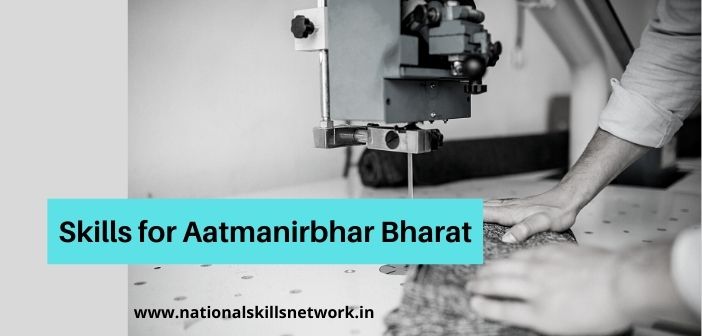In this guest article Ms. Sunita Sanghi, Senior Adviser, Ministry of Skill Development and Entrepreneurship (MSDE) and Mr. Sidharth Sonawat, Senior Consultant, MSDE, share their views on the skills that support Aatmanirbhar Bharat and how the skills can become a source of sustainable competitive advantage.

Taking cognizance of the people who have returned from urban employment hotspots to their native towns and villages, the Government has launched the PM Garib Kalyan Rojgar Abhiyan with a total outlay of Rs. 50000 crores in June 2020 to ensure continuity of their livelihood. The program not only has several policy measures for strengthening economic activity and employment but also has a component for skilling, reskilling and upskilling.

This is the first time that a skill mapping exercise to identify supply and then matching it with demand is being undertaken in independent India. The skill mapping exercise which is being undertaken in collaboration with the State and district administration is providing us an estimate of skills supply present in rural India.
Leading skill ecosystems across the world including South Korea, European Union, Australia and Taiwan among others have been following evidence-based output and employment projections so that future education and skill needs are adequately identified up to a decade before actual transitions. Most nations also intertwine skill anticipation with economic and social policy to create complementarity and promote comprehensive economic development.
However, India experiencing a ‘demographic dividend’ of its lifetime has never been able to undertake formal employment, output or skills projections for the future and continues to rely on general economic projections for policy response. There is also no time-series data of Indian youth capturing their employability, career paths and education/skills. It is no coincidence that issues of curriculum, pedagogy, and relevance (by implication employability) of courses in India are recurring and structural issues in our education and skill systems. From an economic perspective, this has implications not only for the education/skill systems but also industrial productivity and competitiveness.
India’s journey towards Aatmanirbhar Bharat
As the nation embarks on the journey of Aatmanirbhar Bharat, it is an opportune moment to accord ‘strategic’ status to human capital and deepen the integration of long term human capital planning into economic policy as it at the center of the chain of self-reliance.
The drivers of a large domestic market, geo-politics, and competitive economic incentives (compared to other countries) is already showing signs of additional manufacturing capital coming into the country. The Aatmanirbhar Bharat was first announced in May 2020. Since then, the narrative is slowly transforming from one that we just cannot compete in global manufacturing to that of new opportunities and export markets post-COVID and creating an enabling environment for the companies from offshore to locate in India. This is not just a shift in narrative but could reflect the ground reality in the medium term.
India has one of the most diversified bases of manufacturing unlike countries like Bangladesh which depend solely on one segment (garments) for exports. Some dedicated interventions for instance in the case of electronics manufacturing, are already showing results. Electronics manufacturing grew at a rate of 24.5% during the period 2014-18 and its share in global manufacturing grew from 1.2% to 3%.
Moreover, there is a sense of urgency and competition among states to attract investments among states and walk the extra mile in getting projects off the ground. Without a doubt, there would be an influx of new manufacturing capital into the country, creating demand for skilled manpower. The speed and scale of this trend is however not clear yet.
 Taking advantage of India’s demographic dividend
Taking advantage of India’s demographic dividend
On the supply side, to harness the demographic advantage, interventions like Skill India Mission have been made. However, going ahead, we have to be proactive and develop evidence-based plans for our skill ecosystem in anticipation of the new opportunities, so that the incumbent foreign or domestic capital is not stuck with a long chain of hit and trial in getting its act together on productivity and efficiency.
It is critical to identify the skills, their quantum, locations, and forms available in the country. One innovative way to accomplish this is to align each segment of Aatmanirbhar Bharat program with skills anticipation studies, especially for the manufacturing sector based on past trends in factor productivity, employment, export performance and FDI among others. This would provide us the indicators on segments which could see activity in the first instance and those where more measures are required.
In an ideal world for instance, India would like to relocate labour intensive segments like garments, leather and footwear from the world. However, as evidence suggests, it is the largely capital and R&D heavy chemicals, APIs and Pharmaceuticals sector where incremental capacities may come up. The exercise can then enable policymakers to look at incremental measures to make a dent on global labour intensive industries.
Skills for Aatmanirbhar Bharat
While it is beyond doubt that India has the necessary human capital base to support Aatmanirbhar Bharat, we require is a structured view of skills at the industry and enterprise level so that it becomes a source of sustainable competitive advantage. What China now enjoys in terms of scale, we must re-create through the strengths of skills and quality.
Skills needs anticipation cannot provide exact number of workers required for particular trades in the future, but it can provide guidance, enable preparedness and flexibility, and supports more effective operation of labour markets and identified segments of manufacturing. It can enable us to be better prepared for several trends currently witnessed in the labour market. In the context of these changes, and to inform the education and training system far enough ahead to create appropriate training programmes, the systematic anticipation of skills needs is essential. This must be based on evidence on output and employment.
Related Article: Reskilling as a livelihood continuity plan – Read More: https://nationalskillsnetwork.in/reskilling-as-a-livelihood-continuity-plan/
A strategic view of ‘skills’ is also essential for economy-wide productivity gains. Transforming India into a ‘middle- income’ country shall require huge productivity gains across economic spheres. In turn, gains in productivity are directly proportional to candidates entering the workforce being able to match skills with aspirations. While India is continuously leveraging economic reforms related to capital, financial markets, and ease of doing business, it is critical to include education/skill strategies in the same pedestal to generate sustainable gains in productivity.
The global and national backdrop provides us with an opportunity to accord ‘strategic’ status to the human capital so that it can be intertwined with economic planning and it presages the changes in the real economy rather than follows it. An institutionalized approach to skills anticipation can enable policymakers, training providers, employers, and workers to make better educational and training choices, and through institutional mechanisms and information resources leads to improved use of skills.




